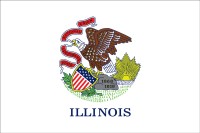Created and reviewed for accuracy by researchers at the Universal Life Church

Congratulations! If you've found yourself at this page it is likely that you are either planning to be married or have been asked to perform a wedding ceremony in Illinois. Ordained ministers of the Universal Life Church have successfully performed thousands of legal marriages in Illinois. The information provided below will walk you through the steps one must follow to become a minister and perform a valid wedding ceremony in the state of Illinois.
- ULC Ordination Accepted: Yes
- Minister Registration Required: No
- Minister's Residency: Irrelevant
- Minister's Minimum Age: 18
- Marriage License Waiting Period: 1 Day
- Marriage License Valid For: 60 Days
- Marriage License Return Within: 10 Days
Local IL Wedding Guides
For more specific information about performing a wedding in certain parts of Illinois, choose a location above. If your area isn't listed, don't worry - just continue scrolling to review the helpful general information on this page.
1 How to Become an Ordained Minister in Illinois
If you haven't already, you should get ordained online with the Universal Life Church. Ordination is free and can be completed in just a matter of minutes. Thousands of legally valid marriages are performed by ULC ministers around the world every year. Begin the process by clicking the big blue button below!
2 Officiating a Wedding in Illinois
Next, you should contact the office of your local marriage authority (typically your county clerk). Let them know that you are a minister of the Universal Life Church in Seattle, and ask what they will require of you to officiate a legal marriage.
Select a county clerk recorder
Choose the county you'd like to contact from the dropdown menu above to see their office’s information.
3 Illinois Officiant Requirements
After you've contacted your marriage authority, you should visit our online store to purchase whatever documentation will be required. We typically advise ministers in Illinois to get an Ordination Package and to add a Letter of Good Standing to his or her order. While Minister registration is not technically required in Illinois you may be required to present proof of your ordination to the county clerk before the marriages you perform will be accepted as having been legally solemnized. Having this proof of your ordination will also provide peace-of-mind to any couple that you intend to marry. Additionally, please attempt to leave at least 3 weeks between the date of the wedding ceremony and your order, to ensure that you receive all of your materials in advance.
Illinois does not require any specific ceremony for weddings, so the minister and the couple each have a great degree of autonomy in planning the special day. Currently, only DuPage County requires that a wedding ceremony include witnesses. In DuPage County, the law requires that marriage ceremonies require two witnesses who are able to comprehend what they are witnessing.
4 How to get Married in Illinois

Illinois's Top Wedding Spot
Cajun food, live blues and a private party room at Buddy Guy's Legends
Now that you've done all of the above, you are ready to perform the wedding! Be sure that the couple has picked up their Illinois marriage license from the appropriate office. This license is valid for 60 days, and there is a mandatory 1-day waiting period between when the couple receives the marriage license in Illinois and when the ceremony may be legally performed. Please be aware that the signed license must be returned to the issuing office within 10 days of the wedding ceremony.
At the Universal Life Church we receive several calls from wedding officiants in Illinois, after they've received their license to marry by getting ordained online, asking for guidance on how to perform a wedding ceremony. Once the legal matters have been taken care of, officiating a wedding (while a sometimes-daunting task) can be a great deal of fun. We would suggest that new Illinois wedding ministers concerned about the ceremony peruse one of our helpful wedding guides. The minister training section of our website should offer a helpful refresher for more experienced ministers.
5 Important Illinois Wedding Planning Tips
If you think you'll spend about a year planning your wedding, you already have something in common with the vast majority of couples in Illinois. In Illinois, weddings are held in all different types of venues, from churches, to barns, to event centers, and even historic buildings. Keep in mind that venues in larger cities, such as Chicago, typically cost more and tend to be more upscale (and expensive). If you take a step away from the concrete clad cityscape to see something more natural, your budget may be able to let breathe a sigh of relief. Oftentimes the further away from the city you go in Illinois, the easier it will be to find what you're looking for at a lower rate. You may also find that your budget goes further in the winter! However, this is because the winters in Illinois are known to be some of the worst in the surrounding states. Freezing temperatures and biting winds can make this time of year less than ideal for a union, but even so, some estimated 5% of couples still hold their ceremonies as the winds pickup and the snow comes down.
Illinois Marriage Code

Illinois Marriage Code
Marriage in Illinois is governed by Chapter 750 of the Illinois Compiled Statutes. Ministers who got ordained online with the Universal Life Church have successfully solemnized thousands of weddings in the state. Below, you will find that we have reproduced a relevant excerpt of this code.Sec. 209. Solemnization and Registration. (a) A marriage may be solemnized by a judge of a court of record, by a retired judge of a court of record, unless the retired judge was removed from office by the Judicial Inquiry Board, except that a retired judge shall not receive any compensation from the State, a county or any unit of local government in return for the solemnization of a marriage and there shall be no effect upon any pension benefits conferred by the Judges Retirement System of Illinois, by a judge of the Court of Claims, by a county clerk in counties having 2,000,000 or more inhabitants, by a public official whose powers include solemnization of marriages, or in accordance with the prescriptions of any religious denomination, Indian Nation or Tribe or Native Group, provided that when such prescriptions require an officiant, the officiant be in good standing with his or her religious denomination, Indian Nation or Tribe or Native Group. View the Illinois Statutes on the official state site.
⇓ Show the rest
Learn All About Marriage Law in Illinois
See the Full StatutesAre you Considering Becoming a Minister in Illinois?
See the Steps to IL OrdinationProceed to your Ordination Application
Become Ordained
